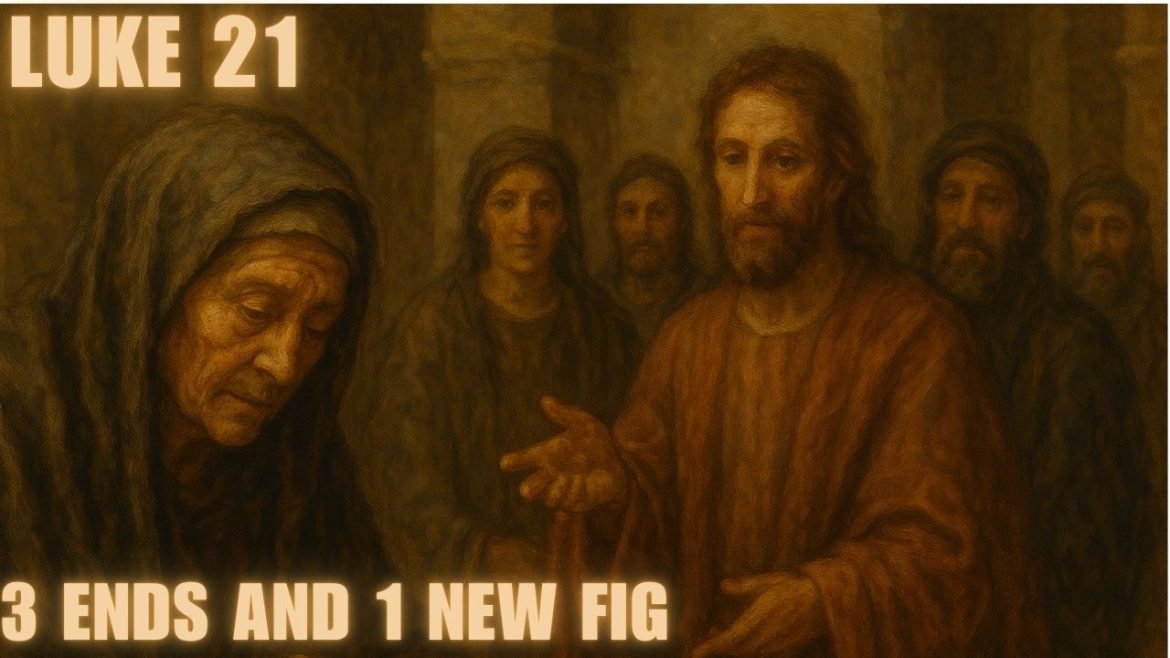Luke 21 presents one of the most emotionally and spiritually intense teachings of Jesus. From a poor widow’s humble offering to dramatic prophecies of destruction and redemption, the chapter doesn’t hold back. In a world obsessed with comfort, certainty, and appearances, Jesus reminds us of what truly matters: faith, endurance, and readiness.
The Widow’s Gift: What God Really Sees
The chapter opens with a scene that turns typical human value systems upside down. While wealthy donors make a show of their generosity, Jesus draws attention to a widow who gives just two small coins—all she has. To the world, it’s negligible. But to God, it’s everything.
Her gift isn’t about the amount. It’s about trust. She gives in faith, assuming God will provide, even though she has nothing left. It’s a deeply human moment—reminiscent of farmers giving the first apples of harvest, trusting there will be more despite threats of hail, pests, or drought. True giving means depending on God, not hedging our bets.
Destruction Foretold: The Fall of the Temple
Jesus then predicts the destruction of the temple, a shocking announcement. Imagine someone declaring, right after a national monument is rebuilt, that it’s about to be destroyed again. That’s how this would’ve felt to the people of Jerusalem.
This prophecy wasn’t symbolic—it literally happened around 70 AD. But Jesus uses it to introduce a broader discussion on endings—of cities, nations, even the world. His message is clear: don’t place your faith in structures, power, or traditions. They won’t last. But God’s word will.
Don’t Be Terrified: Facing Chaos with Courage
Jesus continues with prophecies of global conflict—kingdom against kingdom, famines, plagues, earthquakes, signs from the heavens. These are not abstract metaphors; they’re deeply distressing events. Yet his message isn’t doom—it’s endurance.
He tells his followers not to be terrified. These events must happen, but they do not signal the immediate end. Instead, they are signs—painful ones—that redemption is drawing near. In today’s context of wars, pandemics, and social unrest, this hits home. The world may shake, but God’s kingdom remains firm.
Persecution as a Platform
A striking theme is the idea that persecution is not just pain—it’s an opportunity. Jesus prepares his disciples to be arrested, betrayed, even executed. Yet he tells them: don’t plan your defense. He will give them the words to say.
This isn’t blind optimism. It’s radical faith. We’ve seen modern-day parallels—people who, even in death, used their final moments to witness to their faith. It’s a powerful reminder that courage isn’t the absence of fear but the presence of purpose.
The Son of Man Is Coming
Then Jesus moves from local destruction to global transformation. Cosmic signs will appear—shaking the sun, moon, and stars. People will faint from fear. But his followers are told something different: “Straighten up and raise your heads, because your redemption is drawing near.”
This is the emotional pivot of the chapter. In the face of ultimate chaos, Jesus calls for confidence, not collapse. It’s a vivid image—standing tall when everyone else falls apart.
What Does “This Generation” Mean?
One of the most puzzling statements Jesus makes is: “This generation will not pass away until all has taken place.” Many early Christians believed Jesus would return within their lifetime. When he didn’t, they started writing the Gospels down.
But the term “generation” may not refer to a span of years. It could mean an era—the period between Jesus’ resurrection and his return. We’re still living in that generation: the last chapter of human history. And it’s our job to stay ready.
Stay Awake, Stay Ready
The final message is one of alertness. Jesus warns that the end will come like a trap. People will be distracted, dulled by life’s pleasures and worries. But his followers must stay awake and pray for strength.
It’s a call to spiritual vigilance—not paranoia, but preparedness. We don’t need to fear the end, but we do need to be ready for it.
Bringing It All Home: How We Can Live This Today
This chapter isn’t just a prophecy checklist. It’s a call to action:
- Give generously, even when it costs.
- Stand firm in your faith during trials.
- Speak truth when given the chance.
- Look up in hope when the world looks dark.
- Live alert and prayerful, always ready for the kingdom of God.
Luke 21 isn’t a scare tactic. It’s a blueprint for how to live faithfully in uncertain times.
A Final Encouragement
Jesus ends with reassurance. Despite terrifying images, he wants his followers to feel peace, not panic. God’s kingdom is unshakable. Jesus’ words are eternal. And we are never alone.
As we face the unknown—whether personal struggles or global upheaval—we can echo his call: lift up your heads. Redemption is near.

